COVID-19 Share Graphics
#FundtheFrontLines #COVIDfrontlines #publicservice #protectALLworkers
#FundtheFrontLines

Without our everyday heroes, how can we maintain the very public services we need to beat this pandemic and safely reopen? Call 1-888-981-9704 to tell your senator we need IMMEDIATE aid to our states, cities, towns and schools. #FundtheFrontLines

If federal relief to our states, cities, towns and schools does not come soon, we will continue to lose millions of public sector jobs. Call 1-888-981-9704 to tell your senator to save our public services. Everyday heroes don’t deserve pink slips! #FundtheFrontLines

Our teachers, food service workers and school bus drivers deserve to know that schools will have the resources they need to keep them and students safe from coronavirus. The Senate must pass funding now to protect workers as schools reopen. #FundPublicSchools #FundtheFrontLines

Senators shouldn't go on vacation while millions of students, parents, teachers & school support staff worry about how schools can safely reopen. Call 1-888-981-9704 and tell the Senate to do their jobs & provide aid to #FundPublicSchools & #FundtheFrontLines.

In a few days, the Senate will go on vacation w/o having passed any additional aid for our communities. As they vacation, what are students, parents and our communities supposed to do as the fall semester approaches? @SenateMajLdr: #FundPublicSchools & #FundtheFrontLines

Medicaid is especially important for people of color, who are the most at-risk of serious illness & death from #COVID19. Nearly half of older adults & people with disabilities who are eligible for Medicare & Medicaid are people of color. #FundMedicaid

Millions of Americans depend on Medicaid every day, especially during this public health crisis. A strong Medicaid program is critical – not just to ensure health care for those who need it, but also to save our nation’s & states’ economies. #FundMedicaid #FundtheFrontLines

The creation of Medicaid & Medicare is part of our civil rights history. Because of these programs, hospitals could no longer segregate services by race. Medicaid was and still is important to ending health inequities and disparities. #FundMedicaid

Black communities have been disproportionately hurt by this pandemic. Addressing the racial and economic injustices in this country must include making health care more accessible. @senatemajldr: Stop delaying – #FundMedicaid NOW!

The decision to deliver critical aid to our states, cities & towns is a “no brainer” according to Glenn Hubbard, an economic advisor to George W. Bush. Studies repeatedly show that such aid is a win-win for Congress and our communities. #FundtheFrontLines

According to Mark Zandi, Chief Economist at Moody’s Analytics, the returns on investing in public services during this crisis are clear. As this economic recession deepens, “this is a very effective way to support the economy.” #FundtheFrontLines

"Congress and the administration need to come together and provide support for state and local governments,” says Mark Zandi, Chief Economist at Moody’s Analytics. Urgent aid to our states, cities and towns is VITAL for saving our public services. #FundtheFrontLines

The only way to beat this pandemic and reopen the economy is to invest in the services and the people who make our communities strong: people who provide clean water, safe roads, strong schools, fully staffed hospitals and much more. #FundTheFrontLines

It’s time for Congress to think about the states, cities and towns they represent. When our trash piles up, our water is dirty, and our roads are unsafe because our communities didn’t receive the aid they want and deserve, Americans will remember. #FundtheFrontLines
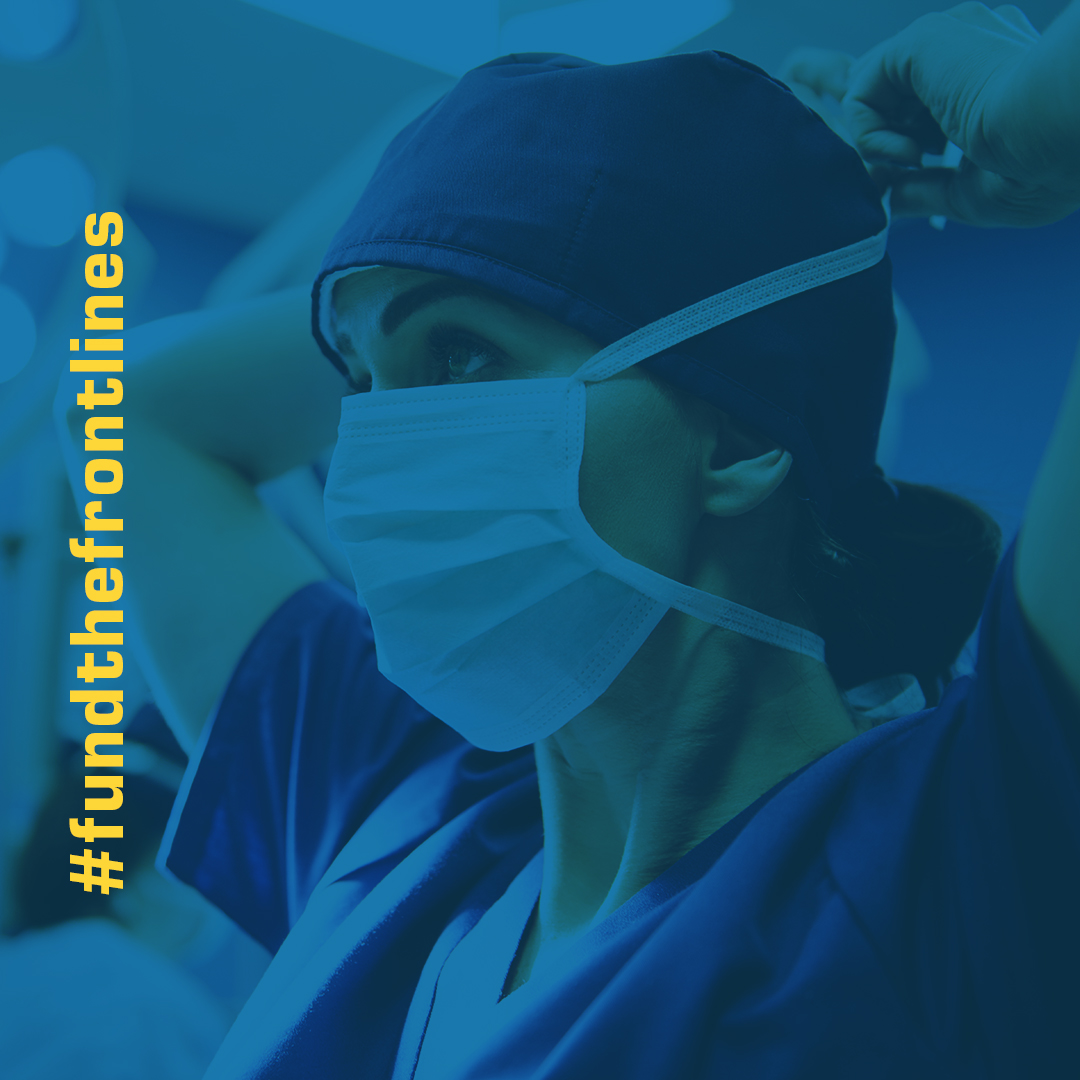
A majority of Americans support aid for states, cities and towns. This aid is key to ensuring that public services such as health care, public safety, education, & sanitation can continue. Without these services, we cannot defeat this pandemic. #FundtheFrontLines

Public service workers on the #COVIDfrontlines have sacrificed so much to keep our communities running. We’re seriously going to thank them with a pink slip?
Call 1-888-981-9704 to demand Congress provide more aid to state and local governments ASAP.

If the federal government fails to provide immediate assistance to our communities, state and local governments will have to make the decision to cut services and lay off public service workers. Tell Congress to #FundTheFrontLines.

Public service workers are essential to fighting #coronavirus and re-opening our economy. We can do neither if we lay them off. Tell Congress to #fundthefrontlines NOW.

Front-line public service workers put their lives on the line to save us. Don’t let Congress thank them with a pink slip. Pass state & local aid NOW! #FundtheFrontLines

We can’t beat this pandemic by cutting public services and giving a pink slip to our public service workers. This is not a winning strategy. #FundtheFrontLines

When we put front-line workers at risk, we put the entire population’s health & safety in jeopardy. To get workers on the #COVIDfrontlines the equipment they need, the White House must fully activate the Defense Production Act. Lives are on the line. #FundtheFrontLines

The death toll is increasing each day, and without protective equipment, more and more public service workers on the #COVIDfrontlines are coming down with COVID-19 themselves. To the White House: Expand the DPA. We cannot win without these front-line workers.

Public service workers on the #COVIDfrontlines are operating with inadequate workplace protections. We call on Congress to IMMEDIATELY pass an OSHA standard to protect our front-line workers no matter where they live.

We wouldn't send troops into war without the proper gear. It’s outrageous that we’re sending public service workers to the #COVIDFrontLines without the necessary PPE. #FundTheFrontLines

Public service workers on the #COVIDfrontlines are operating with inadequate workplace protections even as they do everything they can to protect our communities. We call on Congress to IMMEDIATELY pass an OSHA standard to protect our front-line workers no matter where they live.

There’s no time to waste. With each day that passes, more and more of those on the #COVIDfrontlines are in danger. The White House must expand the Defense Production Act to get the public service workers on the #COVIDfrontlines the PPE they need ASAP. #FundtheFrontLines

How do we preserve & expand critical services that will save lives & protect our communities during this pandemic? Through expanded aid to state & local governments. Congress must DO MORE & ramp up efforts to provide relief for working people & our communities. #FundtheFrontLines

Front-line workers across the country are stepping up to protect our communities. But they cannot fight this pandemic alone. Congress must make sure public service workers have the supplies, equipment and testing they need. #FundtheFrontLines

Years of cuts to public services are hurting our communities like never before. But public service workers on the #COVIDFrontLines still step up to protect our communities. Congress must #FundtheFrontLines NOW.

Front-line workers need proper supplies and equipment to do their jobs safely and fight this #COVID pandemic. #PublicService is about protecting our communities. Congress must #FundtheFrontLines NOW.

Public service workers are already out there each and every day protecting our communities during this pandemic. There's no time to waste. Congress must #FundtheFrontLines NOW.
Member Stories

“Being a plant quarantine inspector means I am on the front lines, defending the state against any harmful invaders,” said Plant Quarantine Inspector Techie Lancaster, a member of HGEA/AFSCME Local 152.
“Whether it’s an animal, plant, disease or other pest, I have the ability to stop it from causing any real agricultural, economic or ecological damage to our beautiful state.” In the midst of a pandemic, and more important than ever, her work keeps the island’s agriculture and food supply lines safe.

“All of us have the same attitude, which is: this is what we're supposed to do, you know?” said Michael Stewart, a medical assistant at Oregon Health & Sciences University and a member of Oregon AFSCME.
This innate selflessness, this belief that one is required to do everything possible to help others, is what keeps Michael going, day in and day out. He also knows that to help as many patients as possible, workers like him must have union representation.

“Right now, there is uncertainty, financial stress, lack of direction everywhere you turn with what is happening in the world, so the need for mental health services is increasingly becoming a focus of attention,” says Pat Garcia, a licensed clinical social worker with New Jersey’s Hoboken University Medical Center and a member of District 1199J NUHHCE/AFSCME.
“Congress needs to pass more direct aid because we can’t bring our communities back if people can’t even cope with what their new reality is.”
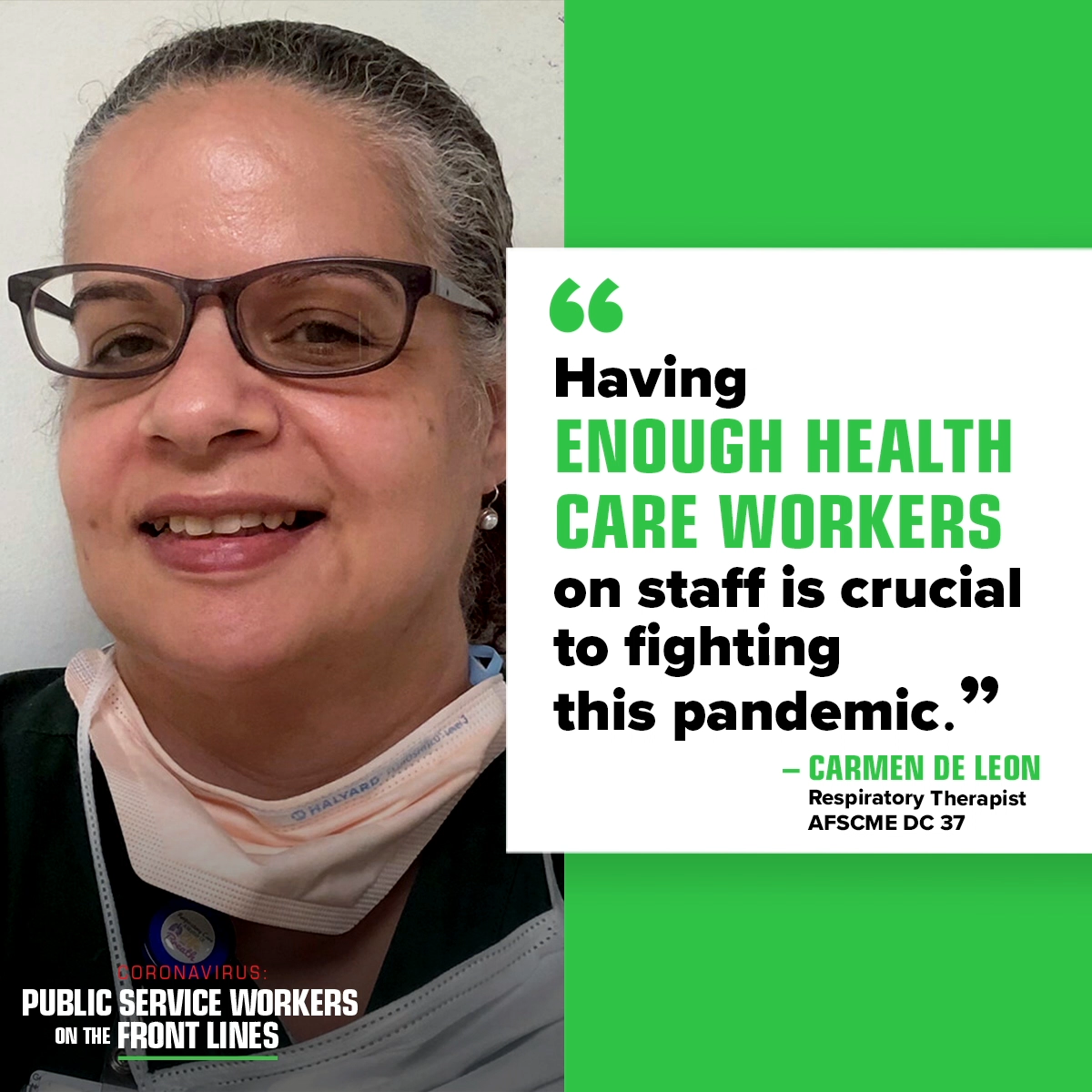
“Public service workers are always essential workers, but especially now, having enough health care workers like myself on staff is crucial to fighting this pandemic,” says Carmen De Leon, a respiratory therapist in NYC and member of AFSCME DC 37.
“With aid for states, cities and towns, we can ensure that these critical public services like health care, EMS and home care continue. My colleagues and I are tough, and we have gone through some of the worst. Together we can beat this.”

“In NYC, EMS are not considered first responders – even though we are responding to these calls every day, even though we are out there saving lives and protecting our communities,” says Vincent Variale, an FDNY EMS lieutenant and member of AFSCME DC 37/UEMSO.
“We have to take action to improve this so a crisis of this level doesn’t happen again... If we have the tools we need to do the job, then we are able to save lives.”
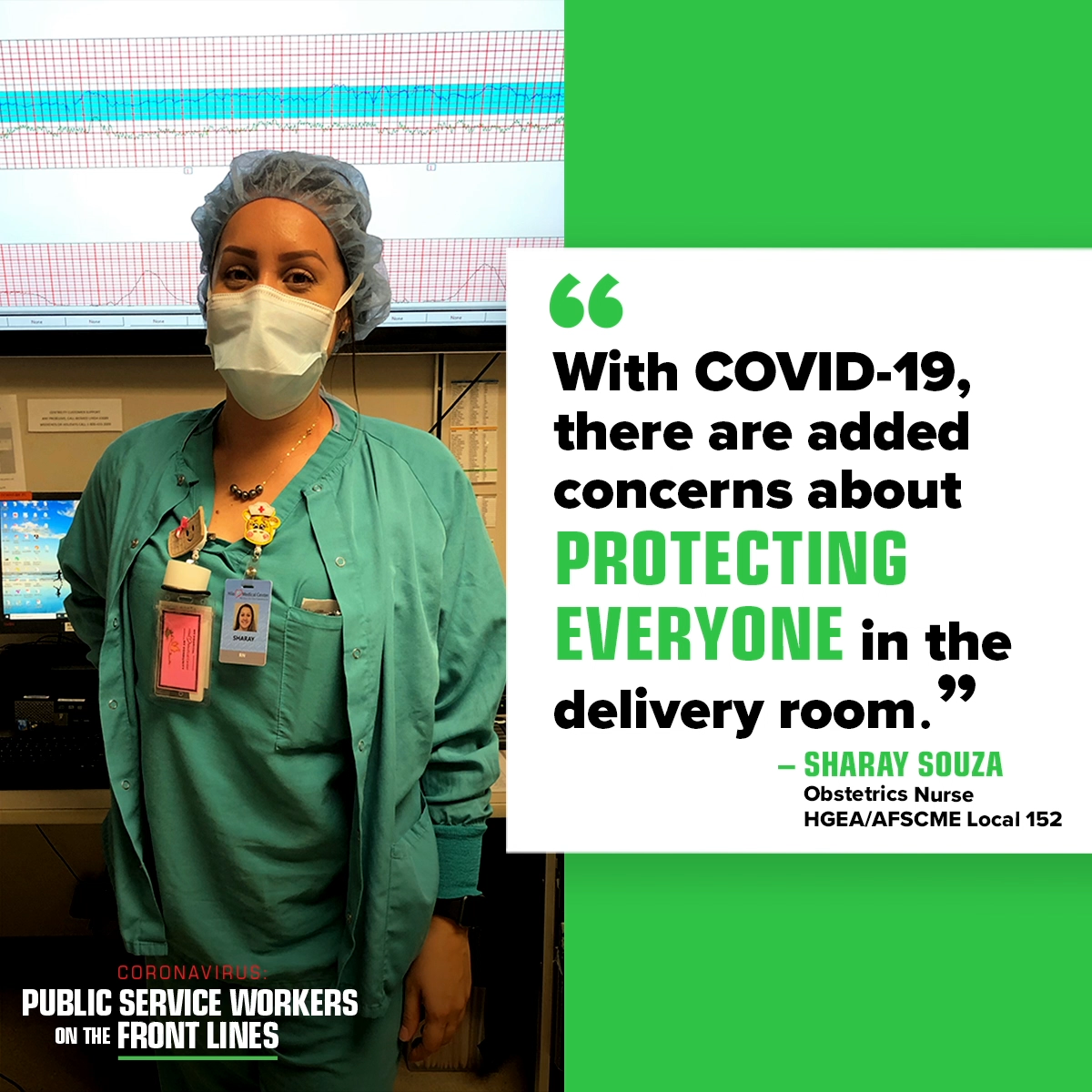
“There’s always some risk that comes with having a baby,” said Sharay Souza, an obstetrics nurse at Hilo Medical Center, and a member of HGEA/AFSCME Local 152.
“But with COVID-19, there are added concerns about safety, keeping the mother and baby healthy, and protecting everyone in the delivery room. We want to make sure labor and delivery is safe and we’re able to provide the same level of care that we do all the time.”
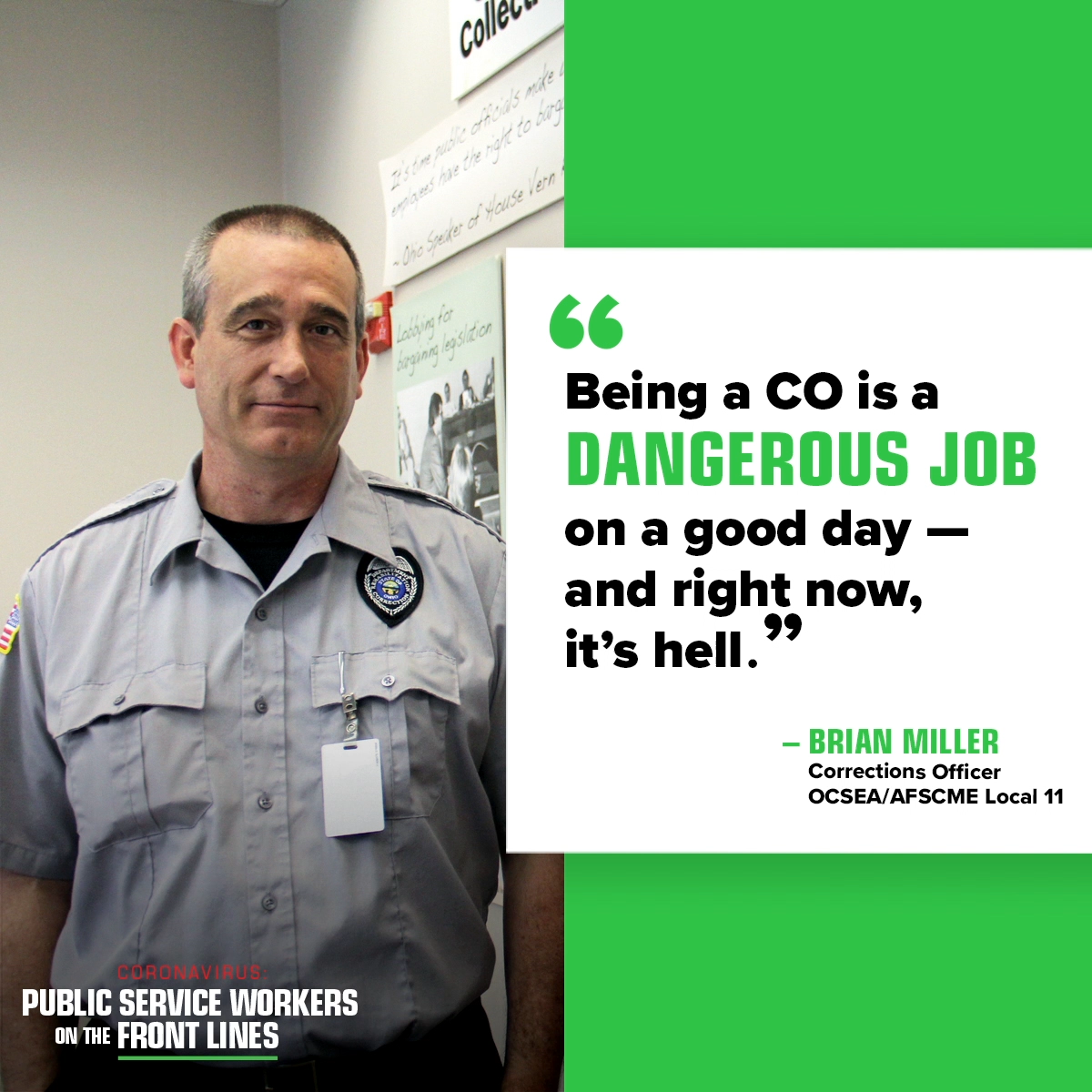
“Being a corrections officer is a dangerous job on a good day — and right now, it’s hell,” says Brian Miller, a corrections officer and member of OCSEA/AFSCME Local 11. He is currently battling a COVID-19 infection himself.
“If Congress doesn’t deliver additional funding and PPE to us, they are betraying us. When I kick this disease, I will be back on the front lines. I hope Congress will fund us and have our backs when I do.”

“We need the federal government to stand up and do right by workers on the front lines,” says Michael Rider, a corrections officer and member of OCSEA/AFSCME Local 11. He and his co-workers remain concerned about the dire lack of personal protective equipment for them on the job.
“We are standing alongside medical professionals in the fight for our lives. We simply want to be treated with that same dignity and respect.”

“We are putting our lives on the line every day. We do this because it is our duty to protect our communities and simply because we care,” says Steve Wales, a corrections officer from Connecticut and member of AFSCME Council 4.
“The COVID-19 pandemic shows why it’s crucial to guarantee funding for our state government programs, and that's why we're calling on Congress to provide robust funding for state and local governments.”

Yajaira Perez, a registered nurse and member of CHCA District 1199, NUHHCE, says her motivation to go above and beyond the call of duty comes from her patients.
“When I go that extra mile, it’s for my patients — and usually because I’m helping someone learn something new. If we can research something together, four eyes are better than two. I enjoy that. I enjoy being able to help.”

“What is becoming clear is that people believe that I am essential during a pandemic, but expendable in their drive to [reopen] America,” says Ramon Williams, a respiratory therapist and member of AFSCME Florida.
“If we see massive layoffs and cuts to public services, entire communities will suffer — both from a public health and economic perspective.”

“I’ve never seen anything like it. I’ve been working for unemployment for 16 years, not even the great recession of ‘08 was anything like this,” says Andrew “Duff” Woodside, an unemployment compensation specialist for the Ohio Dept. Of Job and Family Services and member of OCSEA/AFSCME Local 11.
On processing an overwhelming number of applications non-stop, Andrew says, “When I get tired after working 11 hours, I feel like ‘Well, I got one more in me, let me get one more,’ and that helps me from getting overwhelmed.”

“We can’t reopen schools without the work custodians like myself do to keep them clean and safe for our young ones,” says Shirley Thomas, an AFSCME Florida member and school custodian furloughed by the school district.
“When this pandemic hit, I didn’t abandon the kids or the school where they come for a safe place to learn. I hope Congress won’t abandon me or others like me who just want to help get our communities back on their feet.”

“This has been a very emotional time,” says Tonya Reese, an unemployment compensation specialist for the Ohio Dept. Of Job and Family Services and member of OCSEA/AFSCME Local 11.
“These are people’s paychecks we’re talking about here. Their livelihoods. Customers are in crisis. They are facing the unknown. They are frustrated, they are sad. But everything we’ve ever trained for has led us to this. This is our mission at hand.”

Kristina Johnson-Short, a social services specialist with the Division of Children, Youth and Families in Washington state and a member of AFSCME Council 28 WFSE, describes the essential work that she and her co-workers do to keep children and communities safe.
“As Congress deliberates on another relief package, I would ask them to invest in states and localities so that our governments don’t have to face the choice of which vital services get cut.”

COVID-19 is not slowing down the need for foster homes. Michelle Champagne, a foster parent recruiter and member of AFSCME Council 18, has turned to virtual methods for her online information sessions.
The current pandemic has made the work of securing foster care families even more necessary. “Once stay-at-home orders are lifted, we’re going to see a spike in the number of reports of child abuse.”

“The bag they gave us only works for one home visit. We've been trying to scrounge things up on our own,” says Shannon Martin, an intake investigator for Connecticut’s Department of Children and Families and a member of Council 4 AFSCME.
Her job is one that under normal circumstances can be both dangerous and emotionally taxing, but now comes with additional threats during the pandemic, as she and her co-workers struggle with a lack of protective equipment.

For Heather Burke, a member of AFSCME Council 18 who is tasked with processing adoptive homes for children in Adams County in Colorado, the pandemic exposes the dire state of resources in child welfare.
“We’re recognizing a lot of barriers that are affecting our families,” she explained. “We need more funding to help keep families together. Dollars can buy diapers and bring formula in and help us better serve families.”

“We’re stressed,” acknowledges Esther Salazar, a 911 dispatcher and member of AFSCME Council 962, who is increasingly fielding calls from worried people as she works to keep herself and her co-workers safe.
“I’m worried about my children and my husband. It can get overwhelming, but this is the line of work I do. At work, we’ve become a family and we work it out together.”

What was already a demanding process to provide services for individuals with intellectual and developmental disabilities has become even more challenging now.
“Our goal is to help our participants, providing them with the support and services so they can live safe, healthy and meaningful lives,” says Earl Young, a member of HGEA at the Hawaii Department of Health’s developmental disabilities division. “We won’t stop working to make sure that continues, pandemic or not.”

“Certain parts of this job, there’s no way you can work from home,” Kalani Motta, child/adult protective services specialist and member of HGEA, says.
“When we respond to calls of concern, we have to go out and physically locate the family. The only way we can help these children is if we get out there and do it in person. Our responsibilities haven’t stopped because of the health crisis, but it’s much more stressful to maintain a high level of service.”

“Right now, everyone is competing for the same resources. We won’t be able to contain this virus if folks in some states have PPE but workers elsewhere on the front lines are going without,” says Michelle Prentice, a field paramedic, field training officer and member of AFSCME Local 2960.
“We need PPE to make sure we can keep working and we don't spread this ourselves among our community.”

“We are aware there are some inherent dangers with our work, but we didn’t sign up for a suicide mission,” said Mike Yestramski, a psychiatric social worker and president of AFSCME Council 28/WFSE.
“Because we are not a medical hospital, we are not equipped or afforded the same level of personal protective equipment that we need to prevent exposure,” he said. “Few workers have adequate protective gear.”

Stephen Mittons, a child protection investigator and member of AFSCME Council 31, is still conducting home visits and was given three masks and a handful of gloves to protect himself from being exposed - after he fought for it.
“We’ve been designated as ‘essential’ staff but only have access to equipment as it becomes available,” he said. “We are pushing for DCFS field staff to be considered first responders. Without PPE, we could possibly go home and infect our families or bring the infection to homes we investigate.”

According to Lauren Hartnett, a paramedic and member of AFSCME Local 2507, since COVID-19 hit NYC, the 911 EMS system has been fielding more calls than after the 9/11 terrorist attacks.
The ranks of EMS workers have thinned dangerously due to quarantine and exhaustion, and under an emergency mandate, EMS professionals are pulling grueling 16-hour shifts instead of their normal eight-hour shifts, all without the proper PPE to do their work safely.

“We need to protect everyone. We took an oath as medical professionals. That’s why we are on the front lines,” John Duran, a medical lab specialist and member of AFSCME Local 449, said.
Yet, nearly a month into the fight against the coronavirus pandemic, John says, “We are running short of masks, face shields … critical supplies for our safety. And we don’t know when we’ll see the finish line.”

Since schools closed in mid-March, Sue Foster, president of AFSCME Local 4011, has communicated with her members multiple times a day. She provides front-line members with safety glasses and face masks as they staff more than 60 school food-distribution sites, handing out meals to school children.
“We have several school buses and food trucks delivering to apartment complexes, mobile home parks and community centers,” Foster said. “We are now serving over 15,000 meals a day to anyone 18 years of age or younger.”

“We’re in the most intimate situations. There is no social distancing in our jobs. None,” said Astrid Zuniga, an IHSS provider for her adult son with autism and an executive vice president of United Domestic Workers of America (UDW/AFSCME 3930).
“We are having to bathe [patients], we are having to transfer [them] from bed to bedpan, from bed to shower, helping [them] to dress, there is no 3-6 feet at all. Home care providers are the ones that are having to be on the front lines 100%.”

For Kathleen Bowsher, a rehabilitation therapist and member of Local 2620 (Council 57), the coronavirus pandemic is threatening the delicate balance that exists at Coalinga State Hospital.
Bowsher knows that if COVID-19 were to spread throughout the facility, it would be devastating to both staff and offenders. Many of the patients at Coalinga State Hospital have preexisting conditions, making them particularly vulnerable to COVID-19, and the nearest hospital is 45 miles away.

In the small retirement community of Wickenburg, Arizona, paramedic Seth Cribb and his co-workers, members of EMS Workers United/AFSCME Local 2960, wait.
“There is a sense that it’s the calm before the storm.” But when the storm hits, as it did in cities across the country this week, workers on the front lines like Seth will need the proper equipment to treat patients and fight this pandemic.

First responders like Patti Davidson, a paramedic and member of AFSCME Local 2960, are not getting the full range of resources they need to do the best jobs they can.
“We’ve been shorthanded, as far as staffing levels go, for quite some time,” says Patti. “We don’t have enough N95 masks or enough of the surgical masks they’ve asked us to place on patients. We don’t have the gowns or the full protective equipment we need.”

Donna Ragland, a food service manager at an Ohio high school and OAPSE member, continues to make sure both the students and her co-workers are safe even after schools closed.
“We try to keep everybody safe. There’s still a lot of people at work and on the front lines. You have your union out here, doing the work that needs to be done every day.”
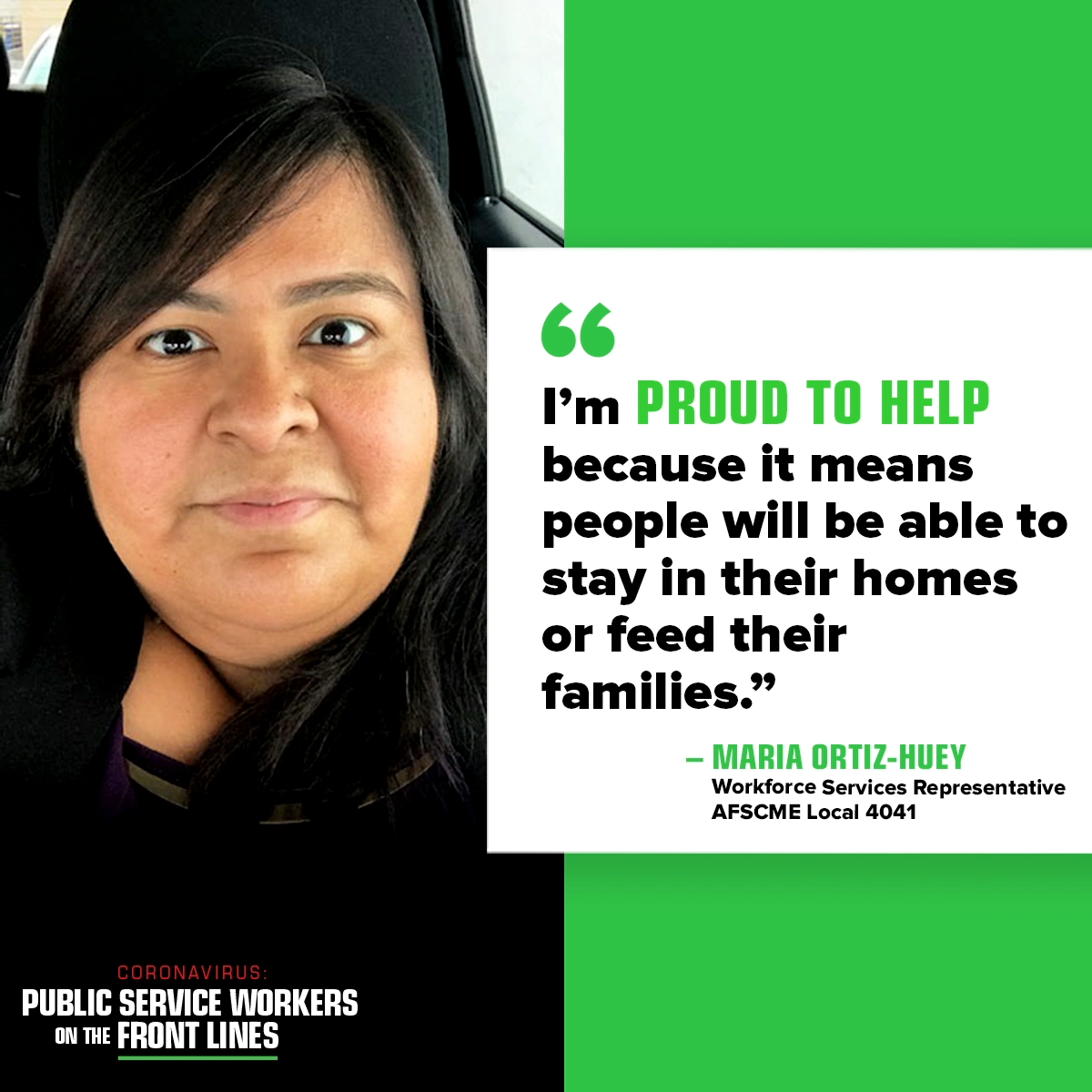
“The work I'm coming into the call center to do is important for my community,” said Maria Ortiz-Huey, a workforce services representative and member of AFSCME Local 4041.
As she handles calls every day for Nevada’s unemployment insurance office, she says “I’m proud to be able to help so many people each day because it means people will be able to stay in their homes or feed their families.”

“Our most immediate concern is a shortage of equipment,” says Jared Rosenberg, a paramedic supervisor in Greenburgh, New York and member of CSEA, AFSCME Local 1000.
“We need more personal protective equipment. We’ve resorted to collecting masks from the public. We’re grateful for what we have collected, but this is no way to prepare for an uptick in cases,” says Jared. There is no time to waste; the federal government must do more to protect those on the front lines.

“The lower-wage workers are the ones who are expected to be in the front lines, but they are not the ones who are even included in the conversation about the way things are being conducted right now,” says Celina Sargusingh, a clinic coordinator at the University of Maryland, College Park and member of AFSCME Local 1072 (Council 3).
Sargusingh says many essential workers are worried about making ends meet. They are asking administrators to clarify how they will be paid and how much, but aren’t getting clear answers.

In White Plains, New York, the president of White Plains Public School Unit 9236/Local 860 Adele Herzenberg described the past week as a “whirlwind.”
In the midst of seeking answers to what the pandemic means for the range of different jobs her fellow members perform, she expressed her appreciation for her co-workers. “I could not be prouder of how our custodial staff – and all of our members – have worked through this.”

The coronavirus pandemic has led to great uncertainly for Lionel Turner and his co-workers – about the shifting nature of their jobs, new roles they might have to take on, and about whether some of them might even get paid.
“Where’s some humanity for people who don’t even make $25,000 a year?” says Lionel Turner, a head custodian at a school in Yonkers, New York.

A mop, a bucket, antibacterial cleaners and, possibly, vaporization machines – these are Leo Laffitte’s weapons of war. This member of AFSCME Local 1716 and a district vice president of AFSCME Council 4 knows just how to wield them, too, having spent 41 years as a custodian and the last 18 at Hartford Public Library.
“We are really taking some vigorous interventions so we can protect us and the community since the library is a community hub.”

“Many of these parents are in the health care field – nurses, nursing assistants, and caregivers supporting patients with developmental disabilities – and they are mandated to work during the crisis,” says Ronora James, a child care provider and vice president of CSEA/VOICE Local 100A.
The health and well-being of the children, their families and her team are at the heart and soul of the essential work James does – and the importance of that work is magnified during this crisis.

According to Shirley Coody, an assistant warden for administrative services at the Louisiana State Pentitentiary and member of AFSCME Council 17, staff is constantly passing out information and keeping everyone in the loop. Everyone at the prison has a part in fighting the virus’ spread.
“We don’t want our officers exposing their families, and we don’t want their families exposing our officers,” Coody said.

“The fear is there, but this is my job,” says Tanisha Woods, a correctional officer and president of AFSCME Local 3920. “I can’t let that cripple me. I can’t do less because of fear. I just think positive and try to be knowledgeable about what’s going on in order to keep myself and [those I work with] safe.”
Woods knows that even though correctional officers may not be in the spotlight, the services they provide are essential.

“I have been licensed for almost 23 years and have not accrued one minute of sick pay. If we have to close, we are facing zero income. That future seems very eerie, very worrisome,” says Miren Algorri (UDW-Child Care Providers United).
Child care providers like her are often the first to educate young children on how to keep germs at bay and are playing a key, behind-the-scenes role in keeping our communities safe.

Pam Wells, a home child care provider and president of CSEA/VOICE Local 100, points to the role that child care providers play in their communities.
“As schools close, the nurses, police officers and thousands of other public service workers responding to this crisis will also need child care for their school-age children.”

Blake Anderson, a member of United EMS Workers (AFSCME Local 4911), was on call with his team and worked around the clock to treat patients on the Grand Princess cruise ship that docked in Oakland, CA.
“I urge our elected leaders to do their part. That means ensuring we have the tools we need to keep doing the job and providing timely and accurate information to the public about how they can prevent exposure.”

Derrick Fields, a head custodian at Medina Middle School in Ohio, and president of Local 580 (OAPSE/AFSCME Local 4), works every day to provide a safe and sanitary learning environment for the roughly 400 students who attend his school.
“If we fail to keep classrooms, gymnasiums and cafeterias clean, that means both students and staff risk getting sick or injured.”
#ThanktheFrontLines

We're thankful for AFSCME members who rushed to the front lines to serve their communities. School admin, support staff, bus drivers & food service workers kept students learning and fed – they deserve the resources to do their jobs safely. #ThanktheFrontLines #FundtheFrontLines

AFSCME workers keep our communities safe, strong and healthy. Even through a pandemic that has killed more than 250,000 Americans, we never quit. We put our lives on the line because we believe in public service.
#ThanktheFrontLines #FundtheFrontLines

EMTs, nurses and doctors have worked tirelessly to save lives during the pandemic. Here's how we can thank them:
- Celebrate safely & avoid large gatherings
- Pass aid to states, cities, towns and schools
#ThanktheFrontLines #FundtheFrontLines
Other Graphics

In our schools, our hospitals and our neighborhoods, public service workers are stepping up to keep our communities safe and healthy. They deserve our respect and gratitude.

Let’s give the people we rely on everyday what they need to keep us safe and healthy. #COVID19 #coronavirus

In our schools, our hospitals and our neighborhoods, public service workers are stepping up to keep our communities safe and healthy. They deserve our respect and gratitude.